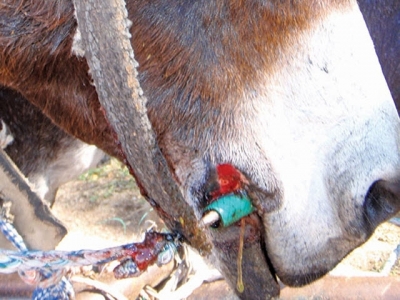How to keep a donkey healthy

Donkeys and horses have several diseases in common, but symptoms and treatment differ, says Prof Cheryl McCrindle.
A donkey with a wound on its mouth, due to a badly fitting bit and bridle. Photo: Cheryl Mccrindle
Tetanus is caused by the Clostridium tetani bacterium, and infection generally occurs through wound contamination. A donkey with tetanus has severe spasms, which eventually paralyse the respiratory system and cause death within days. A foal can be vaccinated any time after weaning, but the vaccination must be repeated after a month. An unvaccinated donkey that suffers a deep wound or has been castrated can be vaccinated, but antibiotics will be necessary to help prevent tetanus.
Botulism, another clostridial disease, is caused by eating old bones on phosphate-deficient grazing. Donkeys can be vaccinated with the vaccine used for cattle. Donkeys can be vaccinated during a rabies outbreak, although current vaccines are not registered for use on them. Occasionally, donkeys contract African horse sickness (AHS), but are more resistant than horses and are not generally vaccinated against it.
They are also susceptible to equine influenza and should be vaccinated if there is an outbreak of the disease. If run with horses, for example in a stud or at a riding school, donkeys should be vaccinated annually. Another bacterial disease, strangles, causes a ‘snotty nose’ and can result in pneumonia, especially in foals. It can be treated with antibiotics similar to those used in horses. Bridles, halters and bits should also be disinfected, as strangles is easily transmitted between animals.
Dourine, a notifiable disease
Donkeys are susceptible to dourine, a protozoal disease transmitted during mating. It causes a gradual loss of condition, resulting in paralysis. The genitalia become swollen, and 2cm to 4cm diameter circular swellings or ulcers appear on the body. This notifiable disease must be reported to the state veterinarian. Donkeys can also die of biliary caused by either Babesia or Theileria equi. Symptoms include anaemia and loss of appetite, and treatment is similar to that used for horses.
Sometimes, donkeys suffer from colic, commonly caused by ingesting plastic bags on overgrazed pasture. Adequate feeding with sufficient hay will prevent this. Treatment is similar to that for horses, but vets should familiarise themselves with effective medication and dosages. Intestinal parasites are the main cause of thinness or weakness in donkeys.
Skin diseases are usually caused by ticks, mange or ringworm, while foot diseases result from foot rot, laminitis, or hooves wearing down on tar roads. Mineral deficiencies can cause overgrown hooves. Wounds, including harness sores, occur frequently, but respond well to daily cleaning with salt water. Use antibiotics in case of infection.
Có thể bạn quan tâm
 No experimental evidence for magnetic alignment in cattle
No experimental evidence for magnetic alignment in cattle Findings contradict earlier claims of south-north alignment in large animals that were based on direct or indirect observations only.
 Feeding cattle: learn the basics
Feeding cattle: learn the basics When rounding off cattle for slaughter, you can either grow and mix feed on the farm or buy ready-mixed feed. If you have only a few animals
 Benefits of fiber-degrading enzymes in dairy cow diets
Benefits of fiber-degrading enzymes in dairy cow diets The addition of enzymatic feed additives to dairy cow diets increase feed intake, animal performance